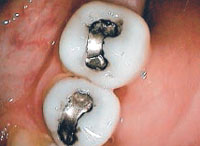|
Metal fillings in teeth burned during cremations will soon be creating more pollution than power stations in the North, it was warned last night.
Disposing of bodies from what dentists refer to as `the heavy metal generation' is starting to release dangerous levels of mercury into the food chain.
Experts last night warned that crematoria will become the country's biggest mercury polluter within 15 years.
Now councils running the region's 10 crematoria face having to pay up to £1m each to install filter systems to guard against the danger.
The mercury is carried in smoke from crematoria chimneys, then falls into the North Sea, and into the food chain.
The Food Standards Agency said high mercury levels in food are especially dangerous for pregnant women, affecting their baby's central nervous system.
Some predict high mercury levels could counter the benefits of eating fish. The warning has been sparked by the high level of amalgam fillings fitted to the generation now reaching the 40s and above.
Dentists last night predicted the end of mercury fillings in teeth was not far away - but with around half of all today's fillings still using the mercury solution, levels in the area not expected to drop for another 50 years. The Government is set to call on crematoria to install gas cleaning filters, which cost £265,000 each - and even more to install.
The Department for the Environment Food and Rural Affairs has warned a quarter of the nation's crematoria may fold because of lack of funding or space to make the necessary conversion.
Councils across the region are currently waiting for detailed new guidelines on how to cope with the problem.
Staff at Newcastle's already cramped West Road Cemetery estimate renovations to bring their 1934 buildings into line would cost up to £1m.
Kevin Jamieson, who oversees cremations at West Road, said: "We have to extend the building one way or another.
"Nobody's sure what's happening at the moment, but it's going to cost. It could be as high as a million."
Professor Jimmy Steele, from Newcastle University's School of Dental Sciences, said: "The current 40-80-year-olds have got far more teeth and far more fillings than their predecessors, so per corpse, the mercury level will increase.
"There's a huge heavy metal generation out there and a lot of people with amalgam fillings from 10-15 years ago that will be cremated at some stage."
Currently consulting across the country, DEFRA said in a report: "It can be roughly predicted that, without intervention, mercury emissions from crematoria in the UK will increase by two thirds from 2000 to 2020.
"The cost of abating mercury by gas cleaning crematoria exhausts in the UK is high by comparison with other abatement costs.
"However past and current practice should not prevent changes in cost assessment, particularly, when by 2020 crematoria will be by far the biggest single contributor to national mercury emissions unless steps are taken."
Crematoria are set to account for 35.5% of mercury emissions by 2020 - three times the levels from coal burning. In 1999 the figure was 15.7%.
A North Tyneside Council spokesman added: "Like most local authorities we are members of the National Federation of British Cremation authorities and we are awaiting guidance and advice on the problem."
Newcastle City Council spokesman said: "In the near future, crematoriums will have to have special filters attached to stop the mercury going into the surrounding air.
"The Government has not said when that is going to happen."
Top
|
